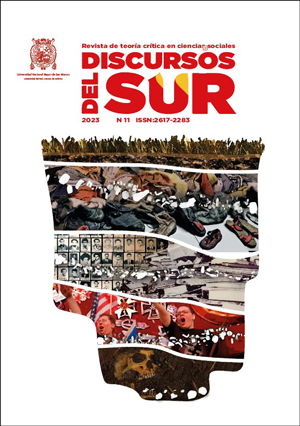Hacer un lugar desde los bordes del sur: arqueología en Chile, memoria y pasado-presente de las dictaduras
DOI:
https://doi.org/10.15381/dds.n11.25861Palabras clave:
pasado contemporáneo, lugar de enunciación, arqueología de dictaduras, memoria, testigosResumen
En Chile, el giro hacia el pasado se asocia directamente a las formas que adquieren las diversas elaboraciones del pasado dictatorial, especialmente en relación con la conversión de los lugares donde aconteció el horror en sitios de memorias. La arqueología se insertó allí en el acompañamiento de estos procesos protagonizados por los colectivos que administran los espacios. El objetivo de este trabajo se dirige a problematizar el lugar de enunciación disciplinar y personal de la arqueología de dictaduras, en los aspectos éticos y políticos que se delinean de la convivencia con marcos de violencia estructurales y luchas lideradas por sobrevivientes y testigos. Para atender a ello, se entregan datos del contexto disciplinar chileno desde un eje histórico y se exponen algunos de los proyectos arqueológicos desarrollados en esta perspectiva. Gran parte de la exposición aboga por dar cuenta de la importancia de vincular esta práctica arqueológica a los escenarios políticos actuales, al establecerse como recurso para actualizar el debate sobre la memoria de la violencia política contemporánea.
Descargas
Publicado
Número
Sección
Licencia
Derechos de autor 2023 Nicole Fuenzalida

Esta obra está bajo una licencia internacional Creative Commons Atribución 4.0.
LOS AUTORES RETIENEN SUS DERECHOS:
a. Los autores retienen sus derechos de marca y patente, y también sobre cualquier proceso o procedimiento descrito en el artículo.
b. Los autores retienen el derecho de compartir, copiar, distribuir, ejecutar y comunicar públicamente el articulo publicado en la revista Discursos Del Sur (por ejemplo, colocarlo en un repositorio institucional o publicarlo en un libro), con un reconocimiento de su publicación inicial en la revista Discursos Del Sur.
c. Los autores retienen el derecho a hacer una posterior publicación de su trabajo, de utilizar el artículo o cualquier parte de aquel (por ejemplo: una compilación de sus trabajos, notas para conferencias, tesis, o para un libro), siempre que indiquen la fuente de publicación (autores del trabajo, revista, volumen, numero y fecha).






